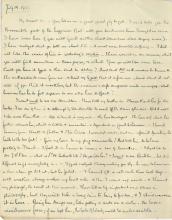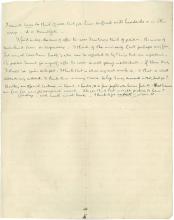BRACERS Record Detail for 18680
To access the original letter, email the Russell Archives.
"My Dearest O.—Your letters are a great joy to get."
Letter 38
BR TO OTTOLINE MORRELL, 14 JULY 1918
BRACERS 18680. ALS. Texas
Previous Brixton letter, BRACERS 19319; next letter, BRACERS 131571
Edited by K. Blackwell, A. Bone, N. Griffin and S. Turcon
<Brixton Prison>1
July 14. 1918.
My dearest O.
Your letters2 are a great great joy to get. I can’t tell you the thousandth part of the happiness that all your kindnesses have brought me since I have been here (you will find another sheet somewhere3 else saying more). I have realized what you tell me about S.S. — it must mean terrible suffering.4 I did not like the review of him in yesterday’s Nation.5 I have written an answer,6 which you will find somewhere in these pages, and which I fear you will like even less. Could you have it typed and then send to Nation? Don’t send MS as it mustn’t be known to the authorities to come from me — and don’t say by post that it is from me.7 Don’t send it at all if you think it worthless, but the reviewer’s safe smugness made me angry — what business has he to feel superior to one who has suffered?
I want much to see Mrs Hamilton. I have told my brother so.8 Please thank her for the books. I see one of them is an attempt by Vandervelde to wash off the stains of his sins.9 But it will take more than that. — Miss Wrinch is very nice — she has developed. She has only what her father allows her, which is little and uncertain and dependent on good behaviour. — I loved hearing from Brett and Gertler10 and Miss Silcox. I would write, but am afraid of making the book look too fat! — Give my love to my pug namesake! And tell him to behave prettily to Frank — I feel it an honour to become a son of Socrates.11 — I should like to see J.R. Mac — what is Ly. M. Sackville like?12 Do you like her? — I want to see Buckler13 — but it is difficult to fit everybody in. — I quite realized Murray making you shy — he was to have come a time when you did not, but he failed. — I haven’t got on with work these last days — wet weather always makes my head ache — and then I want only novels — and I haven’t any philosophy to read at this moment. I have hit on big important new ideas in philosophy, but they will take a long time to bring to fruition, and I shan’t manage it in here. Being here damps one, like putting a mute on a violin. One loses vividness and force; if one kept them, the lack of liberty would be unbearable. I cannot bear to think of all that you have suffered with headache and in other ways — it is dreadful.
I find in day-dreams of after-the-war I no longer think of politics — the mass of mankind seem so despairing — I think of the minority (not perhaps very few, but much less than half) who can be appealed to by things that are important. — The position I want for myself after the war is with young intellectuals — if I have that, I shall be quite satisfied. I think that is where my real work is — and that is what attracts my instinct. I think there is every reason to hope I may succeed in that, don’t you? Books, unofficial lectures in Camb. and London, and a few pupils who become friends. That leaves me free for new philosophical work. Do you think that a right picture to have?
Goodbye — with much much love — I think of you constantly.
Your
B.
- 1
[document] The letter was edited from a digital scan of the signed, handwritten, single-sheet original in the Morrell papers at the University of Texas at Austin.
- 2
Your lettersOttoline’s most recent letter was probably that dated 8 July 1918 (BRACERS 114749), replying to Letter 31. There is also a message on a small sheet, which “arrived too late for last Friday’s letter”; BR dated it July 1918 (BRACERS 114750).
- 3
another sheet somewhere I.e., his second letter to her of 14 July 1918, Letter 40.
- 4
S.S. … terrible suffering Sassoon’s Counter-Attack and Other Poems was published in July 1918. By “terrible suffering” BR referred obliquely to Sassoon’s homosexuality.
- 5
review of him in yesterday’s Nation “Mr. Sassoon’s War Verses”, The Nation 23 (13 July 1918): 398, 400. Although this review of Sassoon was unsigned, BR discovered from Ottoline that it was written by the critic J. Middleton Murry (Letter 48).
- 6
written an answer I.e., Letter 39.
- 7
don’t say by post that it is from me The loopholes in his instructions on concealing his authorship would easily allow Ottoline to inform the Nation’s editor, H.J. Massingham, that Letter 39 was from BR. She concealed his authorship by copying out the letter herself “and sent it off at once by express” (BRACERS 114751).
- 8
I have told my brother so On 3 June 1918 (Letter 12).
- 9
books ... one of them ... by Vandervelde ... stains of his sins Probably Three Aspects of the Russian Revolution (London: Allen & Unwin, 1918) by Émile Vandervelde (1866–1938), a study drawing on the author’s experiences in Russia from May to June 1917 as part of an Allied socialist mission to persuade the new Provisional Government to keep fighting the Central Powers. Vandervelde was a leading figure in the Belgian Labour Party as well as president of the Second International (1900–18), which had collapsed so ignominiously at the outbreak of war as most affiliated socialist parties aligned themselves meekly with their national governments. As a member of his country’s government-in-exile since January 1916, Vandervelde was far more committed to full restitution for Belgium than to a negotiated settlement of the conflict, and perhaps he had “sinned” in BR’s eyes by exhibiting ambivalence about a peace based on the Petrograd Soviet’s formula of no annexations or indemnities.
- 10
Brettand Gertler Bloomsbury artists Dorothy Brett and Mark Gertler (1891–1939) both enjoyed Ottoline’s patronage. She even set up a studio for the former during Brett’s three-year residence at Garsington Manor (1916–19). Gertler was also a frequent visitor to the Morrells’ Oxfordshire estate, where he too painted and was one of many C.O.s to be nominally employed there in alternative service as an agricultural labourer. See Letter 88 to Brett.
- 11
son of Socrates Ottoline told BR (in her letter of 18 July 1918) that a Pug puppy was named “Bertie” after BR — “such a wonder, such an infant prodigy of brain and intelligence, wit and humour”. “Socrates” was the dog’s father.
- 12
What is Ly. M. Sackville like? Lady Margaret Sackville (1881–1963), children’s author and poet, who belonged to the Union of Democratic Control and published a collection of anti-war verse directed mainly at patriotic women who encouraged their sons to enlist (The Pageant of War [London: Simpkin, Marshall, Hamilton, Kent, 1916]). Ottoline answered that she liked Lady Margaret but that she was “too much of a ‘perfect Lady’, too unpassionate — has never been in Love — quite a good mind but never goes to the bottom of things, and so after a bit I find her very tedious” (BRACERS 114751).
- 13
I want to see Buckler Acquainted with BR at Trinity in the early 1890s, William H. Buckler (1867–1952) was an American diplomat attached to the US embassy in London. From there he acted as a conduit for the confidential transmission of British dissenting views to President Wilson. The purpose of the prison visit that BR was considering was probably social. But at BR’s prompting, Buckler had earlier tried (without success) to persuade Washington to intercede for him after he was charged under the Defence of the Realm Act on 4 February 1918 (see Papers 14: 392).


